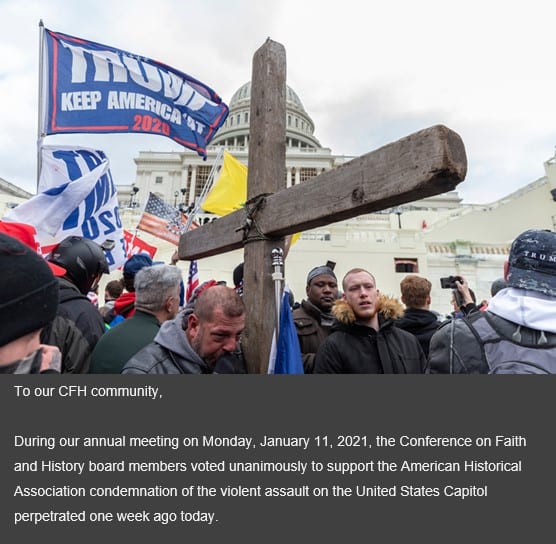 Three members of the Anxious Bench community also serve on the Executive Board of the Conference on Faith and History (CFH)–Beth Allison Barr, Chris Gehrz, and Dan Williams. During our annual meeting on Monday, January 11, 2021, the Conference on Faith and History board members voted unanimously to support the American Historical Association condemnation of the violent assault on the United States Capitol perpetrated one week ago today. As a professional organization bound not only by our commitment to history but also our commitment to the Christian faith, we felt called as a board to take a direct stand against this attack on American democratic norms, this expression of white supremacy, and this gross violation of the principles of the gospel of Jesus Christ. Below is the resolution of the CFH board in response to the assault on the United States Capitol.
Three members of the Anxious Bench community also serve on the Executive Board of the Conference on Faith and History (CFH)–Beth Allison Barr, Chris Gehrz, and Dan Williams. During our annual meeting on Monday, January 11, 2021, the Conference on Faith and History board members voted unanimously to support the American Historical Association condemnation of the violent assault on the United States Capitol perpetrated one week ago today. As a professional organization bound not only by our commitment to history but also our commitment to the Christian faith, we felt called as a board to take a direct stand against this attack on American democratic norms, this expression of white supremacy, and this gross violation of the principles of the gospel of Jesus Christ. Below is the resolution of the CFH board in response to the assault on the United States Capitol.
Resolution of the Conference on Faith and History Executive Board
Response to the Assault on the US Capitol
January 2021
The Conference on Faith and History joins with the American Historical Association and dozens of other academic organizations in condemning the violent assault on the US Capitol that occurred on January 6, 2021, the day when Congress was tasked with formally ratifying the votes of the Electoral College in accordance with the Twelfth Amendment of the US Constitution. As numerous other professional historians have noted, this assault was an attack on the US Constitution, a contravention of the principle of democratic governance, a violation of the principle of the rule of law, and an expression of white supremacy by a mob whose banners, clothing, and other paraphernalia included Confederate battle flags, a noose, and a flippant reference to a Nazi death camp.
Yet the assault was more than merely an attack on American democratic norms; it was also a gross violation of the principles of the gospel of Jesus Christ, perpetrated in part by professing Christians. As members of a professional organization devoted to “exploring the relationship between Christian faith and history” – and as practicing Christians ourselves – we are grieved by the distorted view of the gospel held by evangelical Christians who invaded the US Capitol in the name of Jesus. Some carried banners saying “Jesus Saves!,” while others held up crosses. Some prayed immediately before breaking through police barricades and breaking windows to forcibly and illegally enter the US Capitol.
As people of Christian faith, we agree with Wheaton College’s statement that the assault on the US Capitol included “idolatrous and blasphemous abuses of Christian symbols.” Any time that the name of Jesus is invoked to support evil, the cause of the gospel suffers, and this grieves us.
But this is also a teaching moment for Christian historians – especially for those who have spent their professional careers studying the complicated intersection of Christian faith and political action. As historians, we know that this is certainly not the first moment that the name of Christ has been used to justify mob violence or a distorted view of God and country. White supremacist and anti-Semitic organizations in the United States have frequently employed Christian symbolism and appeals to Scripture to justify violence and exclusion. And when the nation divided in the Civil War, both sides – including those fighting for the perpetuation of the enslavement of Black people – claimed the support of God, even as they killed one another.
Distortions of the gospel occur whenever people conflate the interests of their own culture, race, social class, gender, nationality, country, or political party with the cause of Christ. As Christians, we know that the gospel transcends the boundaries of “all nations” (Matthew 28:19), which means that any claim that the United States is a nation uniquely “under God” is theologically flawed, even if the idea has a deeply rooted history in the United States. While we believe, in accordance with Scripture, that Christians should pray for their government and seek the peace of their community and country, we also believe that Christians compromise the gospel when they equate a particular political leader or even the nation with the cause of Christ. Most such distortions have the practical effect of excluding large numbers of Christ-followers from the definition of “Christian.” White Christians who, in the name of Jesus, refused to recognize the results of the 2020 presidential election perhaps forgot that millions of other praying, Bible-believing Christians (especially Christians who are Black, Hispanic, or other people of color) see the election very differently. We know that our own perspectives on politics are finite and fallible, and even in our own organization, we have a wide range of political perspectives represented. But we are united in saying that we cannot associate the cause of the gospel with a single political party, and we cannot ignore the voices of the tens of millions of American Christians (as well as hundreds of millions of others around the world) who see the gospel very differently than those who equated the cause of Christ with their own partisan and racist agenda when they invaded the US Capitol.
It is perhaps easy to see the evil in the recent attack on the US Capitol, but more difficult to commit to actions that will prevent similar distortions of the gospel in the future. But because we care about the cause of truth, the gospel, the church of Jesus Christ, and the future of our nation, we commit to the following:
- We reaffirm our commitment to seek and speak the truth, and will model the best practices of truth-seeking in our interactions with our students, our colleagues, our fellow believers, and the public at large. The mob that invaded the US Capitol on January 6 was motivated by beliefs that were empirically false. The cause of the gospel is harmed when Christians trumpet such political falsehoods in the name of Jesus. Christians are to be people of the truth, and we therefore commit ourselves to the highest standards of integrity in our teaching, scholarship, and daily lives.
- We reaffirm our commitment to respect all people – a commitment that means not merely tolerating others, but seeking to actively listen to their perspective and learn from their concerns. We recognize that the kingdom of God includes people of all nations, races, and cultures, and therefore, we want to listen to their concerns and learn from their experiences. We will not narrowly construe the gospel to make it conform to the prejudices and presuppositions of our own group. We recognize that all people are image-bearers of God who deserve our genuine respect. Those who are in positions of greater privilege or power have a special obligation to recognize their own blind spots and show particular deference to those who have less privilege or power, including those who come from historically marginalized groups. The people who invaded the US Capitol sought to protect their own interests, but as Christians and historians, we are committed to using our historical knowledge to better understand and respect the interests of others.
- We reaffirm our commitment to respect established institutions and the democratic process, because this is a way to show deference to others, practice love for our neighbors, and imitate the self-renunciation that Jesus practiced. We will model this in our academic institutions, our communities, and our own professional organization.
- Above all, we will respect the Lordship of Jesus Christ, who is far above “every name that is named,” including the name of every political party or political leader in our own country or any other. Sadly, some Christians have used the “Lordship of Jesus” as a justification for acts of violence. But for us, the Lordship of Jesus prompts us to renounce violence and acts of political subversion, because we know that it is precisely because of Jesus’s power that we do not have to exercise our own. We especially do not want to cheapen Jesus’s Lordship by equating it to an earthly partisan agenda or a particular political leader. We will therefore seek to teach, write, and communicate historical knowledge in such a way that it combats the distorted views of history that have led many Christians to confuse partisan agendas with the gospel.
We call on other Christians to join us in these actions. And to those who do not identify as Christians, we want to express our sincere sorrow that some who share our faith in Christ distorted that faith to the point that it did immeasurable harm on January 6, 2021 to American democracy and the people of the United States. To the extent that we ourselves – or our own churches and academic institutions – might have been complicit in perpetuating attitudes that led to this violent distortion of the gospel, we repent, and we commit ourselves to actively opposing such injustice and blasphemy.
Beth Allison Barr, President 2018-2021, and the Executive Board of the Conference on Faith and History













